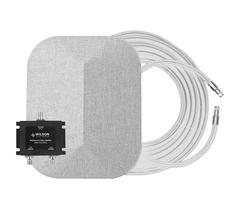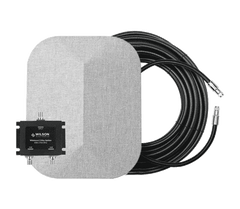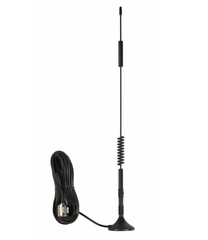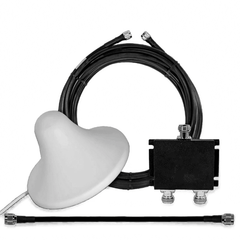RG11 Coax Cable 2 to 125 ft. w/F-Male to F-Male Connectors (75 Ohm)
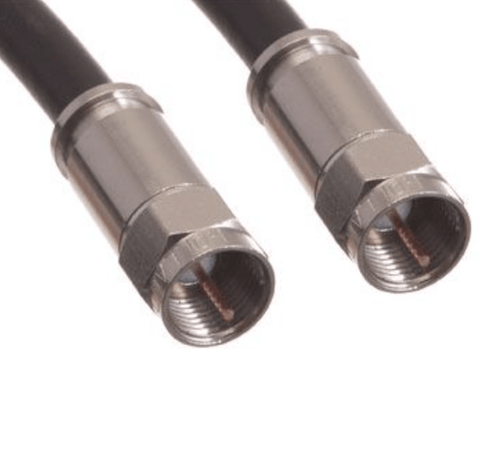
RG11 Coax Cable 2 to 125 ft. w/F-Male to F-Male Connectors (75 Ohm)
Buy Now, Pay Later with No Interest if paid in full within 6-12 months. Choose Klarna payment option at the checkout for details of this, and other long-term low-interest financing options.
Free Lifetime Support. SKU / Model: 951127
1(855)846-2654
Need installation quote, or help with designing a custom solution? Submit a request for quote.
- Description
- Reviews
- Questions & Answers
- Make An Offer
- Warning
Description
Product Description
RG-11 Coax Cable 2 to 125 ft. with F-Male Connectors (75 Ohm)
2 ft. to 250 ft. RG11 low loss coaxial cables (75 Ohm) have F connector on both ends (F-Male to F-Male connectors). These're for indoor/ outdoor cable connections between signal amplifier to both inside or outside antennas. These're cables and adapters like regular TV or video cables typically found in homes.
This is an ultra low-loss coaxial cable made by weBoost / Wilson Pro (both have same parent company, Wilson Electronics). These WilsonPro cables have practically the same minimal signal loss like LMR400 cables. They feature 2/3rds the loss of the RG6 cable (less than 65% of the signal loss of a standard RG-6 cable). They are great for connections between an amplifier to both indoor and outdoor antennas, taps, splitters or lightning surge protectors. Use the 2 GHz rated F-Female to F-Female splice to connect two F-Male terminated cables together.
These cables are 13/32 inch in diameter. Both their ends terminate with an F-Male connector. This cable has around 1-2 dB of additional loss per 100 feet of cable. Please note that 75-Ohm cable cannot handle as much cell data traffic as 50-Ohm cable, so in high user situations you may see a reduction in data speeds. This low loss foam cable can be used both indoors and outdoors with connections between amplifiers and antennas, taps, splitters and lightning surge protectors.
Coaxial cables form an integral aspect of cell phone signal booster installations. Cables run from donor antennas (outdoor antennas) to signal amplifiers, and then connect to antennas inside (broadcast antennas) to distribute the boosted signal. Connectors join the cables using male to female adapters. Connectors link cables between signal meters and outside antennas, and come in handy whether making wireless signal readings or installing a new system. For parts and accessories like this, you can count on SignalBooster.com.
What can the maximum length of cables be?
Generally, SignalBooster.com recommends keeping the lengths of coax cables at or under one hundred feet total from cellular amplifier to interior or exterior antenna. However, this depends on the signal strength outside, the loss incurred in the type of coaxial cable being used, the loss through splitters and / or taps, and how much coverage space would be required. With a good outside signal, higher quality cables, and higher-grade amplifiers, there're plenty of ways to be able to have longer cable runs. For example, if you have a strong outside signal of -35 dB, you can consider a cable run of around 250 feet from donor to amplifier and still have plenty of signal for the amplifier to work with.
What if I need to cut the cable? How do I terminate RG-11 cable?
Cables in this listing already have connectors factory-crimped on both their ends. If you must cut the cable to accomodate your cellular boosting system, you will need to buy F-male connectors separately. You will also need a RG11 stripping tool and a RG11 crimper to get the job done right. Some dikes or a cutting tools are also a handy tool to have around for the job.
First take the RG-11 stripping tool and line it up with the edge of your cable. Spin the tool around the cable several times. You will feel the stripper cut through the shielding as you spin it around the cable. Pull the stripping tool off and remove any remaining pieces that remain. You will be left with something.
Peel the braided metal shielding back so it looks workable. Make sure that no metal shielding makes contact with the center pin. Then slip the RG-11 connector onto the cable. Be sure that the pin from the cable is properly inserted into the pin already in the connector. If the pin is too long, trim from the cable pin and try again until it fits properly. Do not trim the pin of the connector.
Place the connector and cable into the RG-11 crimper and crimp down firmly, bouncing the crimper a few times to ensure you have got a solid crimp. That is it. Now just measure out your cable to the proper length and repeat the process on opposite end.
Reviews
Questions & Answers
QUESTIONS & ANSWERS
Ask a Question-
What is the difference between RG-59 RG-6 and RG-11 cables?
While RG59, RG6, RG11 all have 75 Ohm impedance, their thickness or diameter of center conductor varies and thus their signal loss varies accordingly. Thinner diameter of centre conductor cables are easier to bend but incur higher signal loss. Thicker the diameter of centre conductor, the harder it is to bend the cables and harder to penetrate into walls because they are thicker - but they offer lower signal loss. Per these characteristics, know that RG-59 has smallest diameter and thus most flexible but has highest signal loss. Thus they are typically specified for use as equipment patch cords because of their smaller bend radius and flexibility. RG-6 has wider diameter than RG59 cables and thus less flexible but has lower signal loss than RG59 cables. These are commonly used for cell signal booster distributed cabling for use up to 75 ft. RG-11 has widest diameter of all three type cables and thus least flexible but has lowest signal loss than other two type cables. Its center conductor diameter is almost twice that of RG59. RG11 cables are commonly used for cell signal booster distributed cabling for lengths up to 125 ft.
-
What does RG mean?
RG is acronym for "Radio Guide". This is a standard term to specify different grades of coaxial cables for their applications.
-
Does this RG11 cable have a solid copper core? Thank you.
Sorry, it is not solid copper core, but rather it is CCS (Copper Clad Steel). Thank you.
Data Sheet / User Guide
Make An Offer
Warning
Note: For any signal booster to help, outside signal strength must be at least -110 dB or there must be a clear line of sight to a cell tower that is within twenty miles. Before ordering, please check outside signal level in decibels or ensure that you can make and hold a phone call at any good spot outside where you can mount an exterior antenna. Square footage stated in signal booster listings is based on good signal outside. If it is any weaker, the boosted sq. ft. area will be considerably lower, accordingly.
Kevin K. of Anderson, California gave the following review:
Website is easy to use with plain straight forward info but could have had more on testing signal strength to make sure you get a strong enough booster.
Therefore, please note that stated sq. ft. coverage is based on good signal outside. For best results: If outside signal is weak, we suggest choosing the next higher sq. ft. coverage kit. If outside signal is very weak, we suggest choosing the kit with even more higher sq. ft. range bracket. Basically, higher the sq. ft. bracket, the more powerful the signal amplifier with greater Gain as well as higher uplink and downlink output power.
If outside signal is too weak (weaker than -110 dB), submit request for cell coverage solution assessment. Upon receipt of questionnaire, we will perform residential or business site survey. This will help us determine the system that is needed to improve cell coverage. Then, we will create system design using that system such as femtocell, active or hybrid distributed antenna system (DAS), or other carrier feed signal enhancing method available that will work at your signal-challenged location. Finally, we will schedule for installation after equipment and installation service quote has been approved by you, or your company.
For non installation-included kits: Most home / office / building cell signal booster kits only include bracket to mount exterior antenna on outside wall, edge of roof, or existing pipe up to 2 inches in diameter. Mounting pole not included with most kits, unless stated specifically that it is included for free. Therefore, a mounting post must be purchased separately if you will require it to mount exterior antenna.

Related Products




